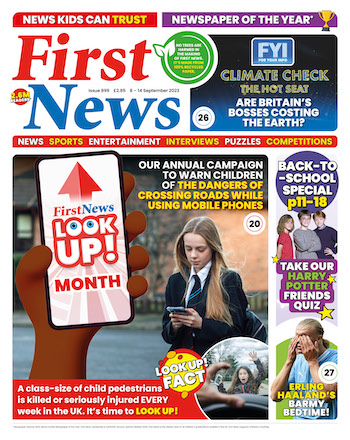
UK newspaper for young people, First News, says as children across the UK return to school and many start to walk by themselves, it is launching the First News Look Up! Campaign as part of its ongoing commitment to child safety for the month of September.
Research found that 21% of 11-year-olds and 25% of 12-year-olds say that they have been distracted by a screen while crossing a road, added the publisher. In the UK, 4,913 pedestrians aged 15 and under were injured on roads in 2022 with 1,417 of them either killed or left with life-changing injuries. This equates to approximately four child pedestrians per day or a classroom-sized group of 28 children each week.
Nicky Cox MBE, First News editor in chief says, “While parents and teachers are rightly worried about their children’s safety at school because of RACC, First News is also worried about their safety getting to school in the first place. The number of child pedestrians who are killed or seriously injured every week is shocking - a class full of 28 children. Numerous studies have shown that pedestrian mobile phone distraction is a major cause of road accidents. That’s why First News’ Look Up! month is reminding children to put away their phones when crossing roads. We have created a free assembly pack and are calling on all schools to hold an assembly about the issue during Look Up! month. The assembly pack can be downloaded at first.news/lookupteachers.”
First News says it is calling on every school to participate in Look Up! month by hosting informative assemblies to address the critical issue of mobile phone-related accidents and promote road safety. These assemblies will provide insights and practical tips to students about the dangers of using smartphones while navigating roadways.

Recent government figures are a stark reminder of the urgent need for action, continued the publisher. In the UK, 4,913 pedestrians aged 15 and under were injured on roads last year, with a heartbreaking 1,417 of them either killed or left with life-changing injuries. This equates to approximately four child pedestrians per day or a classroom-sized group of 28 children each week. Experts have identified that the majority of these incidents occur between 8 am to 9 am and between 3 pm to 7 pm, with children aged 12 most susceptible to accidents as they gain independence while walking to and from school.
Children are disproportionately affected by mobile phone distractions, earning them the dubious distinction of being labelled "SMOMBIES" (smartphones + zombies). A recent study by Childwise revealed that 53% of UK children own a mobile phone by the age of seven. Many studies over the years have demonstrated that phones increasingly distract pedestrians and significantly impact their ability to cross roads safely.
While almost a third of Brits admitted to using their phone when crossing the road in 2021, research carried out by AXA insurance company found that 21% of 11-year-olds and 25% of 12-year-olds say that they have been distracted by a screen while crossing a road.
To find out more, researchers at the University of Calgary pulled together data from 33 studies and looked at the impact of phones on road safety. They looked at how long it took 808 children and adults to start walking, begin and complete crossing a road, whenever they looked left or right and if there were any collisions and close calls with other pedestrians and vehicles. They found that, while talking on the phone made people take longer to cross the road, texting was the most dangerous action as it stopped people looking left and right as much as they should. A study by the University of Lincoln found that nearly a third of road crossings made by secondary school pupils involved a phone or other device and that the students looked left and right less frequently because of this.
The tragic story of Sian Ellis, the publisher continued, a 15-year-old schoolgirl who lost her life while distracted by her mobile phone, serves as a chilling reminder of the life-threatening consequences of phone use near roadways. Sian was struck by a double-decker bus just meters from her school gates in Leicestershire on 28 January 2019. Witness accounts and CCTV footage showed her looking down at her phone while wearing headphones, leading to the fatal accident. Her devastated family now calls on young people and adults alike to learn from this tragedy and to exercise caution near traffic.
To facilitate these Look Up! assemblies, First News says it has created a comprehensive assembly pack that is available to all schools free of charge. This pack includes informative materials and a video presentation to help educators deliver impactful messages about road safety and the dangers of mobile phone distractions.
Teachers can access the assembly pack by clicking here.
First News says it urges schools and educators across the country to join First News Look Up! month and help raise awareness and educating our children about the risks associated with mobile phone use when crossing roads.
Keep up-to-date with publishing news: sign up here for InPubWeekly, our free weekly e-newsletter.











